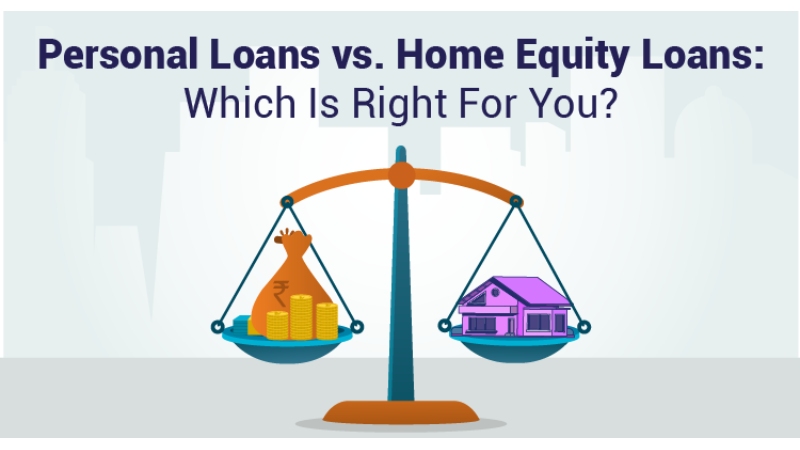Business
Which Loan Type is Best for You, A Home Equity Loan or Personal Loan

Home improvement projects, debt consolidation, medical expenses, and a host of other uses can all be financed with personal loans and home equity loans. For each option, there are differences in the credit requirements and application process.
The fact that home equity loans are secured and require your house as collateral as opposed to unsecured personal loans, is another significant distinction. The fact that they both have a lot of advantages and disadvantages makes it difficult to choose which is ideal for your financial circumstances.
Personal loans vs home equity loans
Both term loans—which you repay over a predetermined time with fixed monthly payments—are home equity loans and personal loans.
Since most personal loans are unsecured, there is less risk for you if you are unable to make payments, but defaulting can still have detrimental effects. Moreover, being unsecured means paying more and having shorter terms than most home equity loans.
| Personal loans | Home equity loans | |
|---|---|---|
| Loan amounts | $500 to $100,000 | $2,000 to $1 million |
| Average rates | 12% | 9% |
| Typical terms | 1 to 7 years | 1 to 30 years |
| Secured vs. unsecured | Typically unsecured | Secured by home |
| Fees | Origination fees, late fees | Origination fees, closing costs, prepayment penalties, late fees |
How personal loans work
Online lenders, credit unions, and banks all provide personal loans as a form of credit. Although they can be used for practically any kind of expense, they are most frequently used for debt consolidation, emergency expenses, relocation, major purchases, and recreational vehicles like boats.
The loan proceeds are paid back in full at the time of disbursement, and interest is due in equal monthly installments. Although some lenders offer shorter or longer terms, the typical repayment period is one to seven years.
A low rate reduces the overall cost of the loan and is more likely to be approved for borrowers with good to excellent credit. Even so, a sizable number of lenders accept applications from borrowers with bad credit.
Usually completed online, the application process asks for some basic financial and personal data. To obtain the greatest offer, compare rates from several lenders.
Pros
Flexibility: Personal loans typically have few or no usage restrictions.
Quick funding: While home equity loans can take weeks to approve and fund, personal loans can be funded as soon as the following business day.
No security needed: Since most personal loans are unsecured, defaulting on them won’t put your assets in jeopardy.
Cons
High-interest rates: Compared to credit cards, personal loan interest rates are generally lower, but they are higher for home equity loans.
Reduced funding amounts: The typical cap on personal loans is $100,000.
Shorter term lengths: Home equity loans have a maximum repayment period of 30 years, whereas personal loans have a maximum repayment period of seven years.
How home equity loans work
Because home equity loans calculate your loan amount based on your home’s equity, which is the value of your property less the amount you owe, they can have higher maximum amounts than personal loans. The majority of lenders allow you to borrow up to 85% of the total loan-to-value ratio of your house.
One significant benefit of a home equity loan over a personal loan is the lower interest rates. However, because your house serves as collateral for the loan, the lender has automatic recourse if you don’t make payments; specifically, it may foreclose on your house.
Applying for a home equity loan is a bit more involved than it is for a personal loan. Even though you can usually apply online, the process usually takes a few weeks because your property has to be evaluated. To find out how much you can borrow and what you might have to pay, you can compare different home equity loans and look into options from the lender holding your mortgage.
Pros
Longer terms: Home equity loans have 30-year terms available, which makes the monthly payment on larger loans more manageable.
Greater loan amounts: The amount of a home equity loan depends on the equity you own in it. Your ability to borrow may exceed $100,000, contingent upon your financial situation and equity.
Potential tax benefits: If the money is used for approved home repairs or improvements, the interest paid on the loan may be deductible at tax time.
Cons
Risk of losing your house: If you don’t make your payments, the lender may foreclose on your house.
Risk of owing more than the property is worth: Should the market decline and the value of your home decline, you run the risk of owing more than the property is worth, which will make it more challenging to sell.
Equity requirements: To be eligible for a home equity loan, the majority of lenders require you to have at least 15 to 20 percent equity in your property.
When to choose a personal loan
In certain situations, a personal loan might be a better option than a home equity loan.
You pay less: Most banks require a minimum of $10,000 or more for home equity loans, though you might be able to find smaller amounts at neighborhood credit unions. Conversely, personal loans might allow you to withdraw as little as $500.
You wish not to jeopardize your home: Since personal loans are typically unsecured, defaulting won’t result in the loss of your home or any other assets.
There is not much equity in you. You might not be eligible for a home equity loan at all if you don’t have enough equity in your house.
Your credit is outstanding: If your credit is outstanding, you can get the best deals on personal loans, with some as low as 7%.
When to avoid taking out a personal loan
If your need for a large loan exceeds the loan limit set by the lender, it is best not to go with a personal loan. Additionally, you should avoid taking out personal loans if your qualifying rate is only high enough to make the monthly payment unaffordable.
When to select a loan for home equity
A home equity loan might be the best option in certain circumstances.
There’s a lot of equity in you: In comparison to a personal loan, you might be able to borrow up to $500,000 if you have accumulated a sizable amount of equity in your house.
It’s not the best credit score you have: Although you won’t get the best interest rates, it may be easier for people with bad credit to qualify for a home equity loan because it is a secured loan.
You’re seeking affordable rates. Rates for home equity loans are generally lower than those for personal loans, which means you’ll pay less for borrowing money and have a smaller monthly payment.
You wish to make renovations to your house: You can write off the interest you pay on your taxes if you use the money from your home equity loan for these improvements.
When not to get a loan secured by your home
If you have very little equity in your home, you should avoid getting a home equity loan, even if you could qualify for a low-interest rate. The advantages of getting a home equity loan in the first place might be easily outweighed by the closing costs and interest paid.
You should avoid taking out a home equity loan if you’re struggling financially and living paycheck to paycheck. If you miss loan payments, you run the danger of losing your house to foreclosure.
Alternative borrowing options
There are other options besides home equity loans and personal loans for taking out large loans. Try one of these options if your financial needs are different.
Home equity line of credit (HELOC)
Similar to a credit card, a HELOC operates. You receive a line of credit secured by your home, usually up to 85% of its value, and you are free to use the money for almost anything. When determining the maximum amount for your home equity loan, lenders also consider your credit score, debt-to-income ratio, and credit history.
The interest rate and monthly payment on the majority of HELOCs are variable. Nevertheless, compared to other loan kinds, HELOC interest rates are frequently lower.
During the draw period, which is typically 10 years, you can borrow as much as you need, as often as you like. By making payments throughout the draw period, you can also top off your available funds. The repayment period, which usually lasts 20 years, will start after the draw period ends.
Credit cards
Numerous benefits are available with today’s top credit cards. Several credit cards come with cash-back incentives or frequent flyer miles that can be redeemed on specific airlines. Additionally, paying your bills on time each month helps maintain or raise your credit score. They can be used as an emergency financial safety net and are just as convenient as cash.
However, there are certain drawbacks to credit cards. Cash advances and balance transfers are subject to exorbitant interest rates on certain credit cards. Your credit may suffer from missing or late payments, and there’s always a risk of credit card fraud on your account. Furthermore, some cards have significant annual fees that range from $25 to over $1,200.
Conclusion
Your financial needs will determine which loan type is best for you—a personal loan or a home equity loan. Although there are benefits and drawbacks to both loan kinds that should be taken into account before applying, both are good choices if you need a loan. Before submitting your application, make sure you have carefully considered all of your loan options, interest rates, fees, and repayment schedules.
-

 Business3 weeks ago
Business3 weeks agoPrakash and Kamal Hinduja: Driving Social and Environmental Change
-
Education4 weeks ago
Fred DuVal: University Leadership as a Critical Resource for Climate Change Research and Life-Saving Solutions
-

 Cryptocurrency3 weeks ago
Cryptocurrency3 weeks agoDesigned For The Masses: How Akasha (AK1111) Is Unlocking Crypto For The Next Billion Users
-

 Health3 weeks ago
Health3 weeks agoThe Hinduja Brothers Commitment to Global Health: Empowering Communities Across Borders
-

 Cryptocurrency4 weeks ago
Cryptocurrency4 weeks agoNexaglobal & Future World Token (FWT): Could This Be the Next Big Crypto Investment of 2025?
-

 Startup2 weeks ago
Startup2 weeks agoCost-Saving Strategies Every Small Business Owner Should Know to Boost Efficiency
-

 Startup3 weeks ago
Startup3 weeks agoMatthew Denegre on the Art of Deal Sourcing: Finding the Right Investment Opportunities
-

 Health2 weeks ago
Health2 weeks agoSt. John’s Community Health Examines Innovations in Pharmacy Access

























